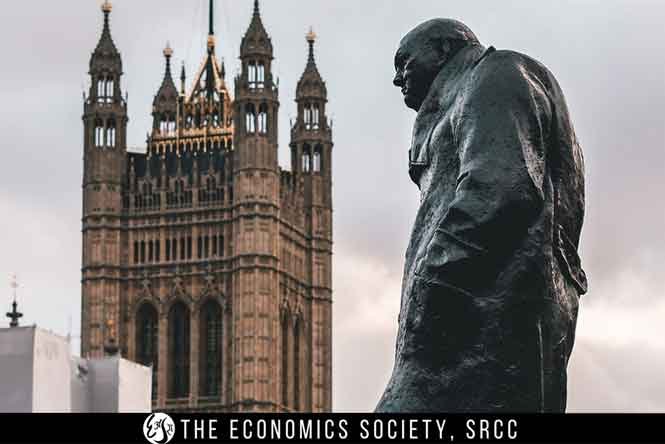World History always has two sides, the perpetrator and the victim. However, history has experienced a man who has been the victim as well as the perpetrator. Through this article, I will be elucidating the actions of Winston Churchill, the man who was regarded as the beacon of light during World War II, but whose malevolent actions resulted in the death of over 3 million Indians in 1943. Born in the Victorian era, Churchill was deemed to be a staunch imperialist and wanted to serve his motherland. Considered to be an impeccable orator since his childhood, he started his influential political career as a Member of Parliament for Oldham in the House of Commons in 1900. Churchill went on to serve the British Parliament for the next fifty-five years. Undoubtedly, his greatest political achievement was being appointed as the Prime Minister of Great Britain by King George VI after the resignation of Neville Chamberlain during the arduous years of the Second World War.
Churchill served his second term as Prime Minister after his party emerged victorious in the General Elections of 1951. Considered to be the most iconic British Prime Minister according to the BBC, he is known to have led Britain through the victorious Second World War with his exemplary statesmanship and diplomatic measures. He is known to have boosted the morale of his nation through his exceptional speeches and quotes which are still notably acknowledged. Leading during Britain’s ‘darkest hour’ and tackling the burgeoning Nazism, was not an easy job. Churchill understood the importance of ally relations, considering which he played an important role in forming ‘The Big Three’. The Big Three consisted of Joseph Stalin of the Soviet Union, Franklin D. Roosevelt of the United States of America and Winston Churchill of Britain.
Stalin could tend to be a difficult ally, however, the collaborative diplomatic measures between these nations are known to be one of the prime reasons for the victory of the allies. Amongst the chaos of emerging victorious from the Second World War, Churchill was also successful in eliminating Adolf Hitler and saving the world from the torment of the Nazi regime, notably one of the only things he did for the welfare of humankind. Churchill was known for his remarks against the propagation of self-rule in India and the dominions of Africa. Black activists and intellectuals criticised Churchill for his racial views as he advocated white supremacy and expressed grave doubts about black rule in Africa. Research suggests that Churchill was a staunch believer of Social Darwinism and often misused the theory to express white supremacist views. Reportedly, Barack Obama’s grandfather, Hussein Onyango Obama, was a victim of imprisonment in Kenya due to his dissent against the racial and imperialist views of Churchill.
Churchill had expressed that only white settlers could have exclusive access to the fertile lands of Kenya, and also heavily advocated against the independence of Kenya. Considering his constant denial of self-rule in India, his sentiments towards the Indian National Congress were certain. Leading in India’s struggle and demand for Independence during the Second World War, Congress was certain about their demand for nothing other than complete independence. Churchill’s malevolent actions and policies towards the disastrous Bengal famine of 1943 are not unknown to this world, however, people still seem to disregard it. In efforts to sustain the British Army and panic hoarding during wartime, food supplies to Bengal were drastically reduced. Repeated warnings about drastic use of Indian resources leading to a famine were blatantly ignored by the wartime cabinet led by Churchill.
Research conducted by the Indian Institute of Technology, Gandhinagar and several US laboratories proved that the famine did not occur due to climatic reasons. Most of the 1940s were affected by the drought, when the famine was at its worst stage in 1943, surprisingly, the rainfall level was above average. Nobel-Prize winning economist Amartya Sen had also proved in 1981 that there were sufficient food supplies available for the Bengali citizens during the years of drought. Madhusree Mukherjee unravels Britain’s ‘denial policy’ in her book, ‘Churchill’s Secret War’. She goes on to say how Britain confiscated boats carrying huge supplies of rice from the coastal areas of Bengal, in order to deny resources to the Japanese Army in case of a future invasion. Even while massive supplies of rice were exported to London from India each day, Churchill constantly denied the intensity of the famine and blamed it on Indians ‘breeding like rabbits.’
There were several people in Calcutta who believed that they could feed their families the next day, but instead became a part of the three million innocent victims of this calculated gruesome political famine. To this day, Winston Churchill is highly glorified by the British public and statesmen. The media has also played its part in several ways, more so through the 2018 film ‘Darkest Hour’, which was triumphant at award ceremonies and the box office. However, it failed to showcase the ‘dark’ side of Churchill and his actions. In the wake of the Black Lives Matter protests in the summer of 2020, several protestors across the United Kingdom demanded the removal of Churchill’s statue in various locations across the country. This is a reminder that newer generations are condemning the abuse and racism in the pages of history, which was previously ignored and even glorified by past generations.
History teaches us to learn from the mistakes of legends and to adapt to their attributes. However, humankind may confuse the mistakes made by a man with glorified attributes. It is finally time that we identify the true legends of history as an accepting and progressive society.
Rituja De
Writing Mentorship 2021
Refrences
1) “Churchill’s Secret War : The British Empire and the Ravaging of India during World War II” by Madhusree Mukherjee published by Tranquebar Press in 2010.
2) https://www.iwm.org.uk/history/how-churchill-led-britain-to-victory-in-the-second-world-war
3) https://www.jstor.org/stable/24479300
4) https://journals.sagepub.com/doi/abs/10.1177/025764300902400205
5) https://www.theguardian.com/world/2019/mar/29/winston-churchill-policies-contributed-to-1943-bengal-famine-study
6) https://www.nationalww2museum.org/war/articles/big-three



